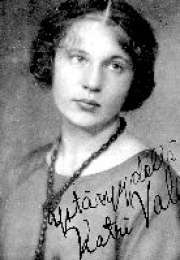|
Биография Katri Vala
( 1901 – 1944 )
One of the Finnish poets who brought a free verse style of writing poetry into the mainstream of Finnish literature. Her work is full of the ecstasy of life, longing for distant places, and a use of vocabulary glutted in color, into which are woven a general radical quality, which affects her late works especially. She is considered a late proponent of the ideals of the Carriers of the Flame. Her earlier works show her dedicated to light and its power.
Her output is not extensive. Mention should be made of:
Kaukainen puutarha (The Distant Garden) (1924)
Sininen ovi (The Blue Door) (1926)
Maan laiturilla (On the Land Wharf) (1930)
In some later works, there is a more serious, darker tone, represented by:
Paluu (The Return) (1934)
Pesäpuu palaa (The Nest Tree Burns) (1942)
Her life’s program was: Oh! If life could be better than death!
Katri Vala died of tuberculosis at the end of WW II, while under treatment in Sweden. Even so, her poetry remained more life-positive than death-positive.
|





